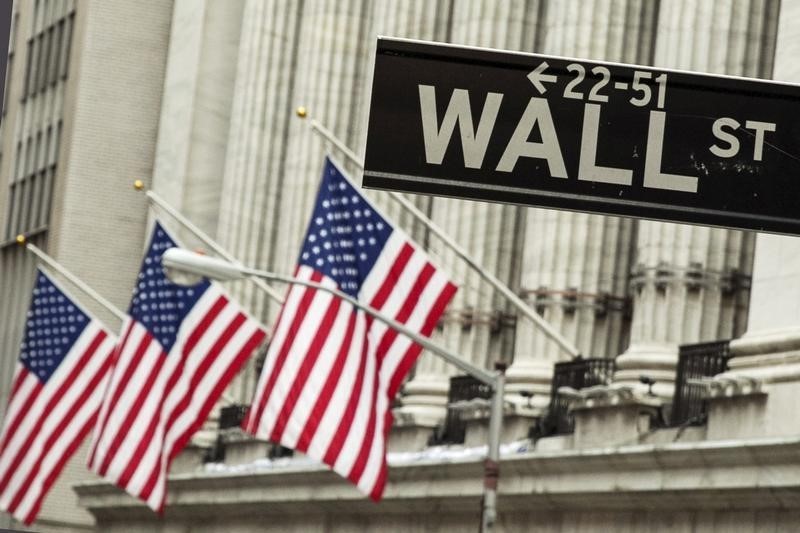Select Language

U.S. stock index futures fell Monday amid growing uncertainty over President Donald Trump’s plans for trade tariffs.
At 05:15 ET (09:15 GMT), Dow Jones Futures fell 115 points, or 0.3%, S&P 500 Futures dropped 32 points, or 0.5%, and Nasdaq 100 Futures slipped 145 points, or 0.6%.
The main averages were closed on Friday for the Independence Day holiday, and a period of profit-taking looks likely after the S&P 500 and the Nasdaq hit record highs on Thursday.
Caution over trade negotiations
Wall Street is set to start the new week on a cautious note with the expiration of a pause to Trump’s heightened reciprocal tariffs set to end on July 9, with the trade talks having only yielded preliminary deals with the United Kingdom and Vietnam, as well as a trade truce with China.
Trump has said that the White House will shortly begin to send out letters to U.S trading partners outlining their new tariff rates, although some confusion has surrounded when the levies would come into effect, with media reports suggesting that rates may not kick in until August 1.
Commerce Secretary Howard Lutnick told reporters on Sunday that Trump will be setting the rates and potential deals now, while Treasury Secretary Scott Bessent had earlier said the tariffs will be imposed as outlined in April if no trade deals were reached by August 1.
This left markets uncertain over just how high Trump’s tariffs will be, given that the president had in early-April announced tariffs going as high as 50% on major economies, while he also said over the weekend that the rates could reach 60% or 70%.
Adding to the uncertainty, Trump also said that countries aligned with the BRICS bloc will face an extra levy over allegedly anti-American practices.
Trump has repeatedly criticized the bloc, which consists of founding members Brazil, Russia, India, China, and South Africa, over its efforts to develop new trade alternatives to the United States.
Fed minutes due Wednesday
There’s little on the economic data slate Monday, and so eyes are likely to turn to the release of the minutes of the latest Federal Reserve policy meeting on Wednesday, with investors keen for more insight into how policymakers see interest rates evolving over the rest of the year.
At its gathering in June, the U.S. central bank chose to leave borrowing costs unchanged at a target range of 4.25% to 4.5%, arguing that a wait-and-see approach continued to be appropriate as more clarity emerged around the impact of Trump’s tariffs on the broader economy.
Tesla hit hard
There are only a few major companies scheduled to report earnings this week, including Delta Air Lines (NYSE:DAL), packaged foods group Conagra Brands (NYSE:CAG) and jeans-maker Levi Strauss (NYSE:LEVI).
Elsewhere, Tesla (NASDAQ:TSLA) shares fell sharply premarket after CEO Elon Musk said he will launch a new political party, as investors fear that the move will likely further divert his attention away from the company.
Brokerage firm Wedbush warned in a Sunday note that Musk diving deeper into politics is “exactly the opposite direction” that Tesla investors and shareholders want from the CEO, especially as the electric car company grapples with declining sales and prepares a pivot into autonomous vehicles.
Musk’s announcement of the “America Party” also comes amid a bitter public feud between the Tesla CEO and U.S. President Donald Trump, especially over the recently-approved “Big Beautiful Bill.”
Crude bounces from OPEC+-inspired losses
Crude prices rose Monday, overturning earlier losses after OPEC+ announced plans to increase output more than expected in August.
At 05:15 ET, Brent futures climbed 0.3% to $68.47 a barrel and U.S. West Texas Intermediate crude futures rose 0.5% to $66.82 a barrel.
The Organization of the Petroleum Exporting Countries and its allies, a group known as OPEC+, announced on Saturday that it will increase oil output by 548,000 barrels per day (bpd) in August.
The hike is larger than the 411,000 bpd increases already implemented for May, June, and July. The group also warned that it will consider another 548,000 bpd hike in September at the next meeting on August 3.
It marks a continued rollback of the voluntary 2.2 million bpd in cuts that major producers like Saudi Arabia and Russia had initiated earlier this year to support prices.
However, the market was also supported by the news that Saudi Arabia raised the August price for its flagship Arab Light crude to a four-month high for Asia, in a show of confidence in oil demand by the world’s largest crude exporter.

